Holyrood 2016: A curious election
- Published
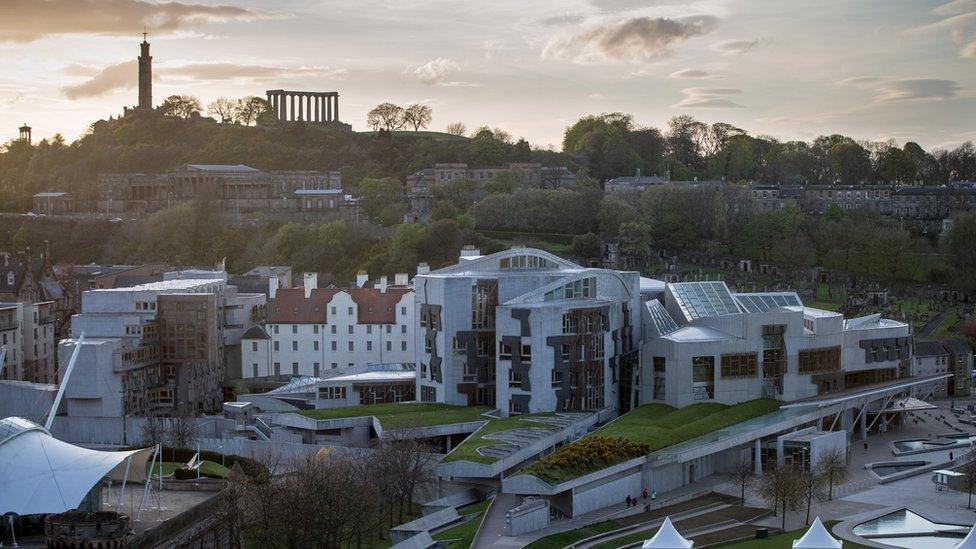
It has been, all in all, a curious election. Not strange, you understand, but certainly curious. Despite the substantial new powers available to Holyrood, this contest has been faintly tepid.
As a number of colleagues have kindly pointed out, I have covered one or two elections. My first such endeavour was in 1979 when the Conservatives ousted Labour from UK power. (What a memory, eh? Sharp as ever.)
There was, I recall, a referendum that year too - although on devolution, not Europe and ahead of the election, not afterwards. (March 1 and May 3, for those who delight in detail.)
Since then, I have reported upon elections to the House of Commons and, later, Holyrood; to the European Parliament; to local authorities in a range of guises.
Each contest has its own momentum, its own character. And yet still this one feels tepid. Not dull. By no means. Just flagging a little.
Reasons? Firstly, the full-scale campaign is too long. Political parties, of course, are constantly seeking votes. But what we laughingly call the "short campaign" has seemed notably prolonged on this occasion.
Can that be changed? No. Could there be a truce? No, not within a fixed term Parliament. Next question.
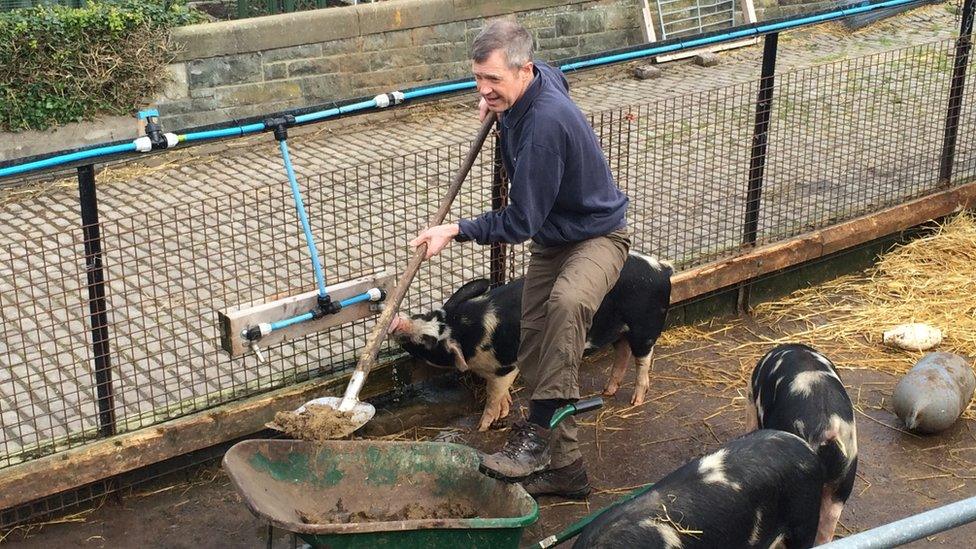
Lib Dem leader Willie Rennie mucked out a pigsty - 'it was glorious...unsurpassed'.
Another issue is perhaps the relative excess of electoral contests. In rapid order, European elections, the independence referendum, the UK General Election and now the contest for Holyrood.
And yet. It would appear that folk were politically energised by the referendum, that their interest in matters of public policy was heightened. Which would tend to counter any sense of ennui, driven by repetition.
Another factor could be that forthcoming European Referendum, pending in June. Yes, it is several weeks after Scotland goes to the polls. But it is a big choice, a fundamental choice. And that choice does appear to be washing back into the Holyrood contest to some degree. As some warned.
On pursuing street opinion via vox pops, I have encountered a few people who, spotting me, have immediately thought "European referendum." (Must be my hairstyle.) You can almost witness the mind shift as they recalibrate to Holyrood. (Many, many thanks incidentally to those who have been willing to stop for me, especially in Spring weather which resembled the blizzard scenes from Narnia.)
But perhaps the most salient factor has been the expectation that the incumbents are set to be returned. The SNP are fully aware of that and have been energetic in urging people to vote (and, of course, to vote for them. Twice.)
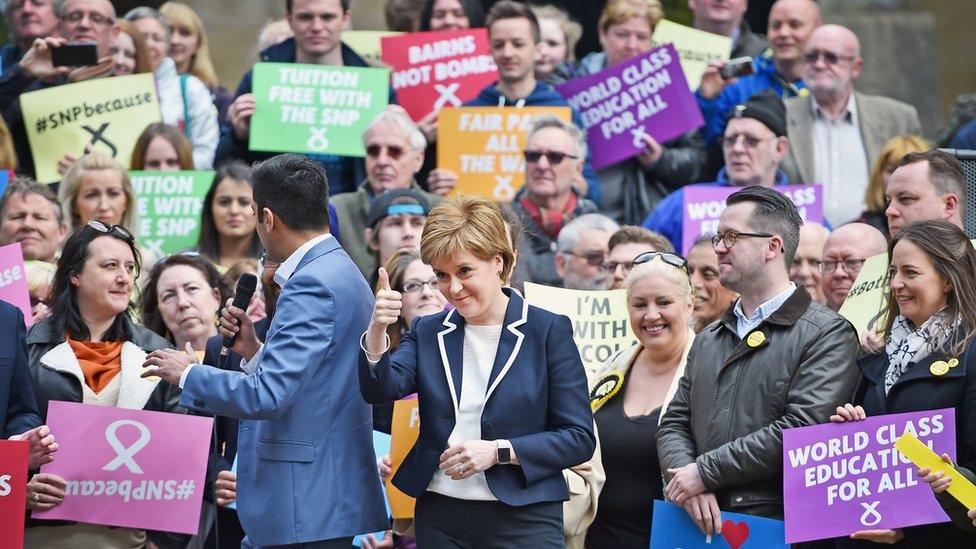
Nicola Sturgeon has urged SNP supporters to vote for the party twice
Their rivals have also enthusiastically urged electoral participation. With all the big parties similarly urging a double vote for them. (The others tend to focus upon the corrective list.)
I understand why the Tories and, in less overt fashion, the Liberal Democrats and the Greens, have felt the need to posit an SNP victory and to offer their services as checking and balancing forces.
It was tactical: proclaiming a role for their party. In the case of the Conservatives, it was designed to foster their aim of overhauling Labour. It was also pragmatic: reading polls and responding.
I understand. I get the concept. However, in terms of the campaign, it scarcely helped engender excitement - except, of course, among the sundry parties who are seeking to advance their own ends.
'Future politics'
It is difficult, in truth, to expect folk with busy lives to get enthused about who might come second in the Holyrood election. Or third. Or fourth.
That does not mean, however, that such outcomes do not matter. They do. A lot. They matter in terms of immediate politics. Laws are made by Parliament, not government. So the variegated colour of that Parliament has an impact.
They also matter for future politics. Will the nature of the political balance change? In the short term? The medium term? Irrevocably? The outcome of these elections offers pointers.
For the avoidance of any doubt, let me state clearly that these elections are decidedly important. If you pay tax, attend hospital or indeed breathe, they matter. (Income tax, health and environment being devolved.)
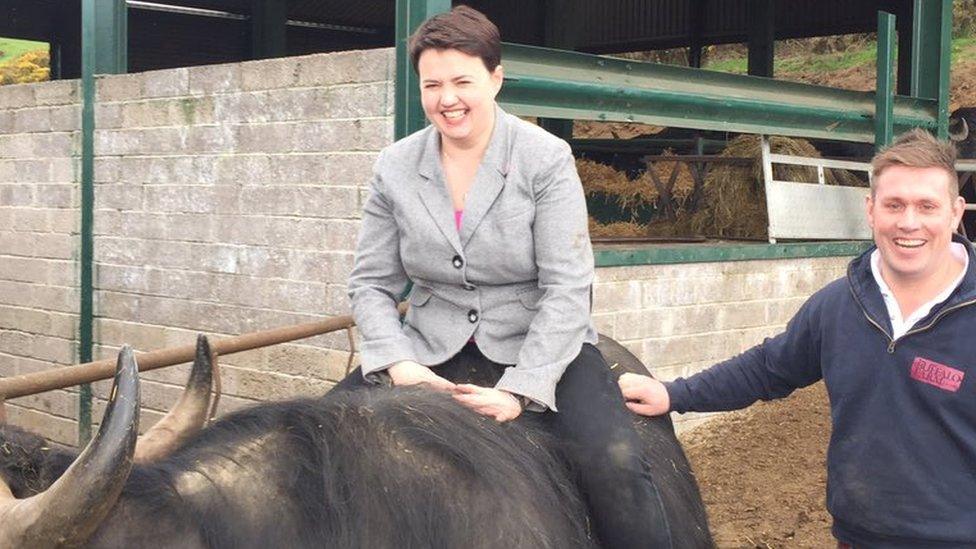
Ruth Davidson secured valuable column inches when she was photographed astride a buffalo
We are choosing Scotland's Parliament - which will make our laws in devolved areas, including much of the criminal law. We are choosing Scotland's government which will take charge of those devolved powers.
And, with new powers, let me repeat that we are choosing the democratic structure which will determine our income tax. The rates and bands. The amount we pay.
I am not going to tell folk that they should vote. That is your choice, entirely. Some may feel unmoved. Some may choose to abstain. Again, your choice.
But remember this. Abstaining is not like boycotting a business you don't like. A Parliament will not take a fiscal hit because you decline to take part. On the contrary, politicians will continue to take decisions which affect your income. Just without your consent or participation.
We will know the winners on Friday. Watch, listen and read all the extensive - nay, huge - coverage on the BBC.
But herewith a few awards to be getting on with. First, the prize for the best photocall. Ruth Davidson and the buffalos would normally win.
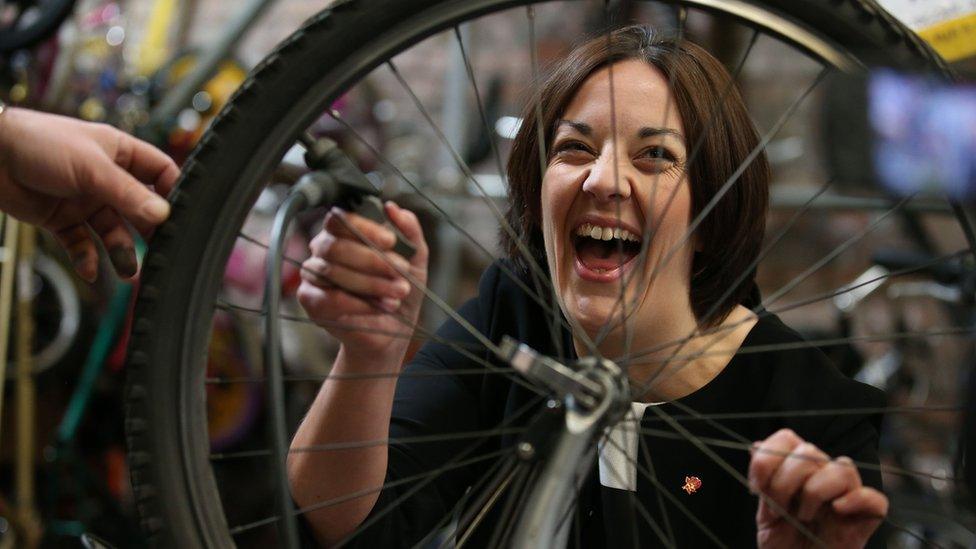
Kezia Dugdale wins Brian Taylor's prize for 'best joke' during the election campaign
But it has to be Willie Rennie and the pigs. I have still to work out the intended effect of this visit. Mr Rennie shares my bafflement. But it was glorious, from mucking out the sty to the "friendly" scene. Unsurpassed.
Next, the prize for the best joke. Been some good ones including a few that were intentional. But Kezia Dugdale takes the award for telling Gary Tank Commander that she was "not a big fan of willie."
The riposte, I believe, flashed across her brain and, in the millisecond available, she chose to deploy it, rather than sidestep. Good thing too.
Next the prize for the best election promise. That goes to Ruth Davidson for her ground-breaking pledge to supply green Fruit Pastilles to the citizenry. Respect.
And, finally, the award for the most striking image. Has to be that ubiquitous poster of Nicola Sturgeon. For me, it called to mind two fine works of literature, for diverse reasons. Those were Persuasion; and The Great Gatsby.
Gallant contender awards, too, to Patrick Harvie and David Coburn. Indeed, to every single candidate. Everybody has won and all must have prizes.
Except they haven't. And they won't.